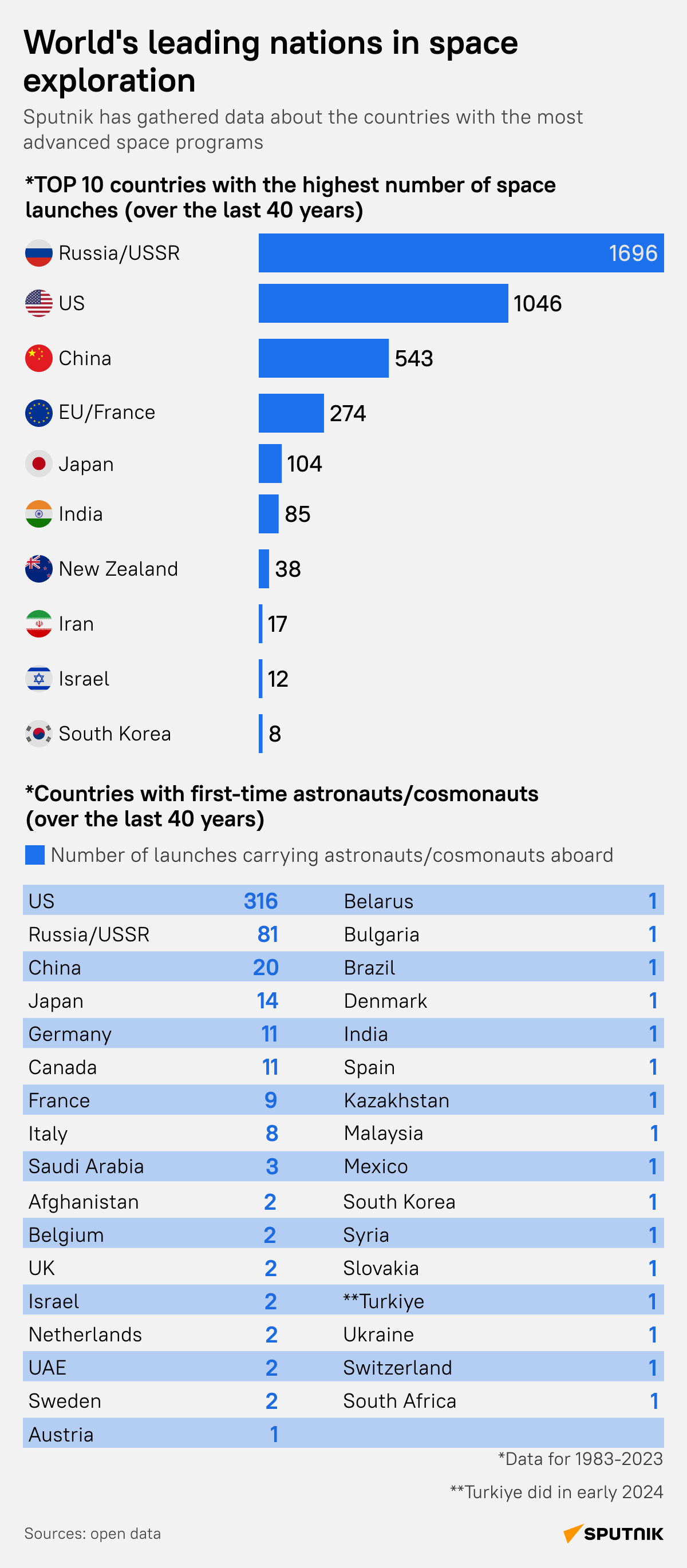https://sputnikglobe.com/20240411/exploring-global-space-programs-1117855183.html
Exploring Global Space Programs
Exploring Global Space Programs
Sputnik International
In 2011, the UN General Assembly (UNGA) declared April 12 as the International Day of Human Space Flight, commemorating the beginning of the space era dating back to 1961, when the USSR's Yuri Gagarin carried out the very first human trip into the beyond.
2024-04-11T10:11+0000
2024-04-11T10:11+0000
2024-04-11T10:11+0000
military
infographic
yuri gagarin
ussr
earth
un general assembly
space exploration
space travel
space mission
https://cdn1.img.sputnikglobe.com/img/07e8/04/0a/1117854676_0:0:1280:720_1920x0_80_0_0_943b8a3c51b91808d755cd8879c87e59.png
Russia's successful space launch today marks the fourth in the Angara-A5 heavy rocket's history and the beginning of flight and design tests for the Amur space rocket complex with heavy-class Angara carrier rockets from the Vostochny Cosmodrome.Previous test launches took place from the Plesetsk Cosmodrome in 2014, 2020, and 2021.Today's launch occurred on the eve of April 12, declared by the UN General Assembly (UNGA) as the International Day of Human Space Flight to commemorate the beginning of the space era, which dates back to 1961 when the USSR's Yuri Gagarin carried out the very first human space flight.Gagarin led the Vostok 1 mission, during which he completed a single orbit around the Earth over a 108-minute flight. Since, humankind has moved a step closer to the age-old dream of exploring the far and the unknown. Over the past 40 years, the top 10 countries with the most robust national space programs have carried out more than 3,800 space launches, boarding experienced cosmonauts and first-time astronauts alike.Judging by the official figures, it is clear that international interest in space exploration keeps growing, regardless of whatever domestic or foreign challenges might arise.Check out Sputnik's infographics to learn more!
ussr
earth
Sputnik International
feedback@sputniknews.com
+74956456601
MIA „Rossiya Segodnya“
2024
Sputnik International
feedback@sputniknews.com
+74956456601
MIA „Rossiya Segodnya“
News
en_EN
Sputnik International
feedback@sputniknews.com
+74956456601
MIA „Rossiya Segodnya“
Sputnik International
feedback@sputniknews.com
+74956456601
MIA „Rossiya Segodnya“
which countries have their own space programs, nations with major space programs, first human in space, who is yuri gagarin, international day of human space flight, how many people have been to space, countries with most astronauts
which countries have their own space programs, nations with major space programs, first human in space, who is yuri gagarin, international day of human space flight, how many people have been to space, countries with most astronauts
Exploring Global Space Programs
In 2011, the UN General Assembly (UNGA) declared April 12 as the International Day of Human Space Flight, commemorating the beginning of the space era dating back to 1961, when the USSR's Yuri Gagarin carried out the very first human trip into the beyond.
Russia's successful space launch today marks the fourth in the Angara-A5 heavy rocket's history and the beginning of flight and design tests for the Amur space rocket complex with heavy-class Angara carrier rockets from the Vostochny Cosmodrome.
Previous test launches took place from the Plesetsk Cosmodrome in 2014, 2020, and 2021.
Today's launch occurred on the eve of April 12, declared by the UN General Assembly (UNGA) as the International Day of Human Space Flight to commemorate the beginning of the space era, which dates back to 1961 when the USSR's Yuri Gagarin carried out the very first human space flight.
Gagarin led the Vostok 1 mission, during which he completed a single orbit around the Earth over a 108-minute flight. Since, humankind has moved a step closer to the age-old dream of exploring the far and the unknown.
Over the past 40 years, the top 10 countries with the most robust national space programs have carried out more than 3,800 space launches, boarding experienced cosmonauts and first-time astronauts alike.
Judging by the official figures, it is clear that international interest in space exploration keeps growing, regardless of whatever domestic or foreign challenges might arise.
Check out Sputnik's infographics to learn more!



